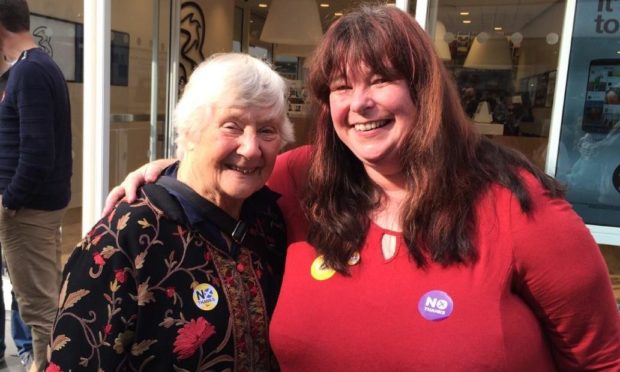They say you should never meet your heroes because you will be disappointed.
That was never the case with Shirley Williams. She was everything you wanted her to be and more. When I shyly approached her as a teenager to ask her to sign her book, she took time to talk to me and I no doubt made her characteristically late for her next meeting.
She was unfailingly kind, and she had this knack of making you feel special. She would remember who you were – no mean feat for someone who met a lot of people.
Shirley was the reason so many people of my generation got involved in politics. Her passion to tackle inequality, to banish unemployment, to bring people together motivated and invigorated us. She’s been a key influence on my politics and my way of thinking and I owe her an awful lot for that.
As a 13 year old in Caithness, I was inspired by Shirley’s courage in leaving the Labour Party in early 1981. I will never forget the speech she made when she announced she would stand in the Crosby by-election where the Tories were defending a huge majority and the Liberal Party had come a distant third in 1979. She said that sometimes you had to take risks and scale unscalable heights. And she did in pursuit of the SDP’s aim to break the mould of British politics.
I was distraught when she lost in 1983 but I particularly admired her subsequent work for Harvard’s Project Liberty, an initiative designed to help the offices of government in the emerging democracies of central and eastern Europe transition from controlling the people to serving them.
Incredible energy despite routine sexism
Shirley first became an MP in 1964 when there were fewer than 30 women MPs out of 635. She often described the sexual harassment women MPs routinely faced. She also had to put up with being patronised by journalists. I almost choked the first time I watched the 1979 election programme and saw Robin Day, the veteran election programme anchor, tell her how pretty she was looking as he discussed Labour’s losses, which included Shirley’s own seat.
In recent years, it was her incredible energy on the campaign trail that put so many of us to shame. Well into her 80s, she would travel the length of the country to support Liberal Democrat candidates and she always made the point of thanking everybody for what they were doing.
Shirley would have made a brilliant Prime Minister. Maybe we wouldn’t be in the mess we are in now if she had been able to implement the reforms we still so badly need
She was at her absolute best on a five day long trip to Scotland at the tail end of a bitter and divisive independence referendum campaign in 2014.
The Saturday before the referendum, she walked down the High Street in Dunfermline with Willie Rennie and a crowd of Better Together campaigners. She wowed almost everyone. Her charms were perhaps lost on the Yes campaigner with the megaphone who yelled: “Bow to your imperial overlords” as we posed for a photo, but she had some really lovely conversations with people.
The most touching moment was when a Yes campaigner came up to say how much she had always admired her. Shirley must have spent 10 minutes talking to her, holding her hand. It was a moment of harmony in an often toxic campaign.
Still connecting with young people at 84
What amazed me the most was the number of young people who wanted to talk to her. This was an 84 year old woman who had last held government office before their parents were born, yet she was able to connect with them.
She could talk at length on almost any subject in the most compelling and persuasive manner without a single note. There was many a time when she saved the Lib Dem leadership from itself at our Conference. Back in 2016, after a tense debate on whether we should have a nuclear deterrent, she was very influential in persuading Conference to back the leadership’s proposal and did so in her usual conciliatory, thoughtful and wise way.
I think Shirley would have made a brilliant Prime Minister. She said that she was perhaps too much of a consensus seeker to succeed in that role, but that was what a divided country needed back in the 1980s. Maybe we wouldn’t be in the mess we are in now if she had been able to implement the reforms we still so badly need.
Caron Lindsay is the Scottish Liberal Democrats equalities spokesperson and candidate for Almond Valley

